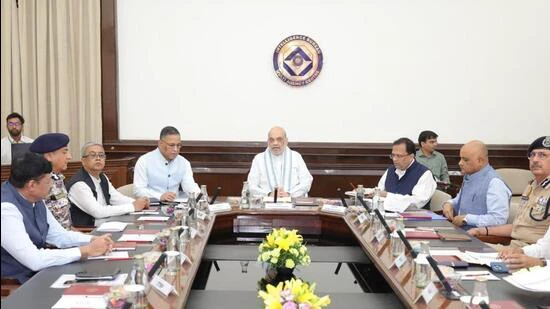Union home minister Amit Shah on Friday lauded the intelligence agencies for their accurate information during the Operation Sindoor, while adding the strikes inside Pakistan and Pakistan occupied Kashmir (PoK) on May 7 early morning reflected a good coordination between India’s spy agencies and armed forces.
The home minister said the operation was “a unique symbol of the firm political will of Prime Minister Narendra Modi, accurate information of intelligence agencies and the infallible strike capability of three armed forces”.
He made the remarks while inaugurating the new multi-agency centre (MAC) at North Block on Friday.
MAC is a national intelligence-sharing fusion centre under the Intelligence Bureau (IB) where states and central agencies and police forces coordinate to share, store, collate and analyse inputs on terrorism, on a daily basis, under four heads – J&K, Northeast, LWE and Rest of India.
It was created in December 2001 in the aftermath of the Kargil conflict, but was strengthened in December 2008, following the 26/11 Mumbai terror attacks.
At the new MAC centre launch, which was attended by the heads of all states’ police, central security and intelligence agencies, Shah said “India is proud of its armed forces, the Border Security Force (BSF) and all security agencies” as he referred to Operation Sindoor.
Shah said recently concluded anti-Naxal operation in Karregattalu Hills in Chhattisgarh-Telangana border demonstrate the excellent coordination between our security forces”.
“Similar coordination was also seen during Operation Sindoor, which shows that there is a very good coordination in the process and thinking of our intelligence agencies and the three-armed forces in carrying out the work,” he added.
Operation Sindoor was India’s direct military response to the April 22 terror strike at Pahalgam in Kashmir that killed 26 civilians.
Indian forces launched the operation in the early hours of May 7, bombing nine terror camps in Pakistan and Pakistan-occupied Kashmir (PoK). The pre-dawn strikes on May 7 — in which at least 100 terrorists were killed according to political leaders briefed about the attack by the defence minister — sparked a series of attacks and counterattacks across the western border, involving fighter jets, missiles, armed drones, and fierce artillery and rocket duels. In one such counterattack on the night of May 9-10, the Indian Air Force struck targets at 13 Pakistani air bases and military installations. After four days of fighting, military hostilities were stopped on Saturday evening as the two nations reached an understanding.
The new MAC, Shah said on Friday, “Will provide a seamless and integrated platform for synergising the efforts of all the agencies in addressing the complex and interconnected national security challenges being faced in today’s environment”.
Asserting that this new network will strengthen the country’s efforts to tackle serious threats like terrorism, extremism, organised crime and cyber-attacks, Shah said “it incorporates futuristic capabilities such as embedded AI/ML techniques to harness the potential of the vast database with MAC and GIS services”.
Shah also laid the future roadmap by emphasising the need to integrate other significant databases housed with different central agencies in different silos, on this platform for leveraging the advanced data analytics made available with new MAC, the Union home ministry said in a statement.
“This new network is expected to elevate the quality of data analytics generated on the MAC network to a higher level, enabling accurate trend analysis, hotspot mapping and timeline analysis to give predictive and operational outcomes. The new MAC will go a long way in combating the terror ecosystem having intricate linkages with the organised crime,” he added.
The home ministry said that the new MAC has connected all the intelligence, security, law enforcement and investigative agencies.
Executed at a cost of over ₹500 crore, the new MAC network has undergone both qualitative and quantitative transformation. “The new MAC network spanning the length and breadth of the country, has weaved-in country’s island territories, insurgency affected areas and mountainous high-altitude terrain ensuring last mile connectivity down to the level of district superintendents of police in the remotest areas with a fast and standalone secure network,” the MHA said.
